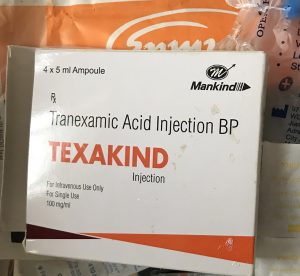By Dr. Sunday Dominico, Clinical Director at Thamini Uhai
The Thamini Uhai maternal health team in Tanzania has rapidly introduced a new treatment that has been shown to reduce deaths among women who experience severe blood loss after giving birth.
Last year, the WHO updated its recommendations for treating post-partum hemorrhage after a major study, conducted in 21 countries and including more than 20,000 women, reported positive results of using a medication called tranexamic acid. The World Maternal Antifibrinolytic (WOMAN) trial and others found that, when used alongside other treatments, the medication reduces death due to bleeding in women with post-partum hemorrhage, regardless of the cause, with no adverse effects.

Dr. Sunday Dominico, Clinical Director at Thamini Uhai (left) and Hassan Lukuba, nurse-midwife (right) at Mwakizega Dispensary in Kigoma, Tanzania
Case Study
SZ has just delivered a healthy, three-kilo baby boy at Mwakizega dispensary, a health facility that Thamini Uhai supports in Kigoma, Tanzania, but all is not well. She loses 1,200 ml (more than two pints) of blood in 15 minutes because her uterus does not contract as it should after birth. Her blood pressure drops to a dangerous 90 over 50 mm/Hg, her pulse is racing at 132 beats per minute and her arms and legs are getting cold. The nurse-midwife quickly administers three liters of fluid and starts a drip of oxytocin, a common drug that helps the uterus contract after birth. The nurse also administers a new treatment, intravenous tranexamic acid, started 30 minutes after delivery. The bleeding subsides and SZ’s blood pressure and pulse return to normal. The mother is reunited with her son one hour after delivery and starts breastfeeding. After 12 hours of uneventful monitoring, mother and baby go home.
Post-partum hemorrhage (PPH), commonly defined as a blood loss of 500 ml or more within 24 hours after birth, is the leading direct cause of maternal death worldwide and the main cause in most low-income countries. A 2014 study published in the Lancet estimated that 661,000 women died of PPH from 2003 to 2009. In the new guidelines, the WHO encourages ministries of health to ensure that this life-saving medication is available, regardless of levels of resources, especially in facilities offering emergency obstetric care.
While active management of the third stage of labor has reduced the number of cases of hemorrhage, and use of oxytocin, other uterotonics, blood transfusion and in some cases obstetric surgery are effective treatments and can be life-saving, the global community welcomed the new evidence.

Tranexamic acid
Thamini Uhai, supported by Bloomberg Philanthropies and Fondation H & B Agerup, began implementation immediately in the 46 facilities in Kigoma that the program has supported at various times in its 10-year history. Early this year, the team distributed 830 vials of tranexamic acid and trained health providers to administer the medication. As of the end of April, it is estimated that at least 40 women with PPH have been treated with tranexamic acid. In the coming months, Thamini Uhai will monitor the implementation of this new treatment and document its impact on maternal health outcomes while continuing to advocate for its use and possible adoption into Tanzanian guidelines for management of PPH.